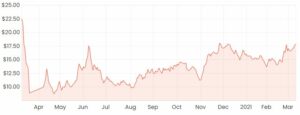The travel sector is the place to be on the ASX lately, with Flight Centre Travel Group Limited (ASX: FLT) rising, Sydney Airport (ASX: SYD) up and Qantas Airways Limited (ASX: QAN) making good gains despite the broader ASX200 (ASX: XJO) being mixed at times.
The positive momentum in travel stocks seems to be the result of the Australian Government announcing that it will support the travel sector by subsidising the cost of around 800,000 flights to regional areas in the country. According to the article out of the Australian Financial Review, the initiative will be available for trips booked between April 1 and July 31 on a first-in, best-dressed basis.
Flight Centre CEO Graham Turner expressed his disappointment in the support plan, explaining how companies like Flight Centre are unlikely to be beneficiaries of the idea, but investors have responded differently and have been buying up the stock in response to the news.

Conditions improving
As global vaccination plans continue to rollout, Flight Centre appears to be well-positioned for recovery until international travel volumes return to pre-COVID levels.
Annualised costs have been reduced by almost 70% in the past 12 months and it’s increased its liquidity position to $1.2 billion as of 31 December with the help of a recent convertible note issue. However, according to Macquarie analysts, available liquidity might be closer to $900 million after considering bad debts and bank covenants.
Stronger than normal sales number in December meant that Flight Centre was able to reduce its monthly cash burn from $43 million to $30 million. Being conservative, this would imply a cash runway of around 2 years before the company would need to raise additional capital.
It seems management remains optimistic about the recovery and indicates that pent up demand will help have a rebound effect on sales. Given Flight Centre’s heavy weighting towards domestic travel, things are likely to improve as vaccination programs continue to achieve falling case numbers.
The UK contributed around 10% of pre-COVID total transaction value (TTV). The country’s lockdown phased exit plan still in the works may see a significant uptick in domestic volumes to resume in April and international in May.
As we emerge out of COVID-19, it might be the case that many of the smaller players will unfortunately not make it through to the other side, but this may play to the advantage of the larger players like Flight Centre that increase their market share and win new corporate accounts.
Are Flight Centre’s shares a buy?
While the Government’s support plan could provide some momentum in the short-term, it’s not an ongoing stimulus package. I think it’s unlikely to play to the success of some of these companies in the long-run. As such, I wouldn’t be buying shares on this news alone.
Stimulus aside, is there an investment case to be made for Flight Centre’s shares?
It’s important to remember that the company has nearly doubled its shares on issue since the onset of COVID-19 in order to raise capital. Additionally, its latest $400 million convertible note comes with a conversion price of $20.04 per share, meaning there’s nearly another 20 million shares that will further dilute shareholders in the future.
Looking back to FY19 when Flight Centre last made a profit, it generated $263 million in profit and earnings per share of $2.60, putting it on a Price/Earnings (P/E) ratio of around 14.6 at the time, based on its current share price of around $38.
If I assume that Flight Centre could achieve that same level of profit in FY21, being $263 million, it would give earnings per share of $1.31 based on its current 199.25 million shares outstanding.
Applying the same P/E of 14.6 would give a current share price just over $19. Given how close this is to today’s share price, this implies to me that the market has priced in more than just a recovery back to profitability, and instead, it implies a much faster recovery back to pre-COVID levels.
Given that an additional 20 million shares will be issued from the most recent convertible notes, I don’t think Flight Centre’s shares represent fantastic value despite them still trading nearly 50% below their pre-COVID levels.
In saying this, if I did currently hold shares in Flight Centre or Webjet, I wouldn’t necessarily be selling at this point, as a full recovery seems to be a likely outcome in the long-term.
For more share ideas, click here to read: 3 more “buy the dip” ASX shares to buy in a market crash: XRO, OCL & CSL.





